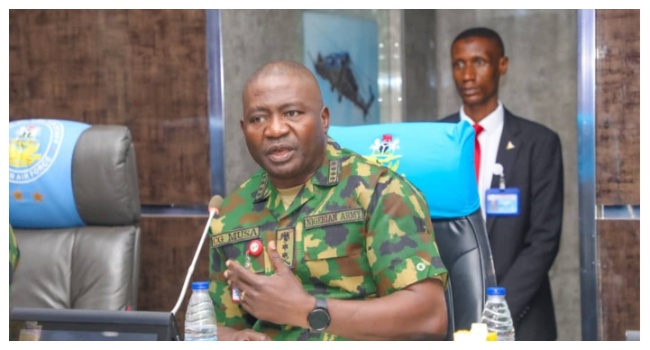By Bomba Dauda
General Christopher Gwabin Musa, the Chief of Defense Staff (CDS), has elevated the fight against terrorism, armed banditry, kidnappings, oil theft, and pipeline vandalism to unprecedented levels. In the northwest, where banditry and kidnapping have historically posed significant challenges, the military has delivered impressive results. Recently, security forces have successfully eliminated notorious bandit kingpins, including Kachalla Halilu, Buharin Yadi, Dangote, Boderi Isyaku, and Dogo Rabe, further showcasing the military’s effectiveness during General Musa’s tenure.
It is encouraging to witness the substantial progress made by the nation’s security apparatus under General Musa’s leadership in combating insecurity and insurgency. The ripple effects of military interventions across troubled regions are remarkable, as evidenced by the positive trends in oil production data from the oil-rich Niger Delta and the surge in agricultural activities in farming communities during the current season.
The volume of agricultural outputs is expected to rise significantly compared to previous harvests. Many farming communities previously under the control of bandits have now been liberated by security forces and are experiencing an unprecedented sense of peace.
Recently, maize prices in local markets such as Saminaka in Kaduna State have dropped to between N500 and N600 per measure, a notable decline from the pre-farming period when prices soared to N1300 to N1500 in April.
If the exchange rate were more favorable, it would have reduced input costs and overall production expenses, alongside increased farmer participation due to improved security. Additionally, if market interventions to curb the influence of middlemen were implemented, food prices could be significantly lower than current retail rates.
Commercial farmer Mr. Ephraim Joshua, who owns a large farm along the Kaduna-Kachia road, shared that he was unable to cultivate his land during the previous two farming seasons due to rampant insecurity. However, this season, he successfully planted maize on five hectares, yielding approximately 250 bags of produce.
The primary challenge now lies in the government’s ability to prevent the hoarding of agricultural products, which can lead to artificial scarcity and the smuggling of food into neighboring countries. Ensuring food availability in a cost-effective manner is critical. Security plays a vital role in our GDP growth and economic prosperity, and General Musa’s adeptness in tackling the multifaceted nature of insecurity has significantly influenced our short and long-term prospects concerning national and food security.
The government must establish a robust national food program that capitalizes on the improved security situation in many farming communities, fostering increased agricultural output.
The military’s efforts along the Abuja-Kaduna expressway, particularly in areas such as Birnin Gwari, Kauru, Zango-Kataf, Zaria, Giwa, Kaura, Sanga, and Kubau in Kaduna State, have effectively curtailed the heinous crimes perpetrated by bandits, mitigating threats to farmers. However, Maro and Kauru remain critical areas where challenges persist.
On October 29 and 30, 2024, General Musa visited the remote community of Maro in the Kajuru Local Government Area of Kaduna State, furthering his commitment to making the country a safer place. He addressed troops at Kachia and Kafanchan, emphasizing the importance of diligence and assuring them of their welfare.
Maro, an isolated agrarian community, has suffered from persistent attacks due to its geographical vulnerabilities. The Bani Kanwa forest has rendered Maro particularly susceptible to bandit incursions, leading to its classification as an ungoverned space with little to no governmental presence.
In August 2024, the Maro community took proactive measures by raising funds to construct a security post for law enforcement agencies, aiming to address ongoing security challenges that have kept farmers from their fields.
—











